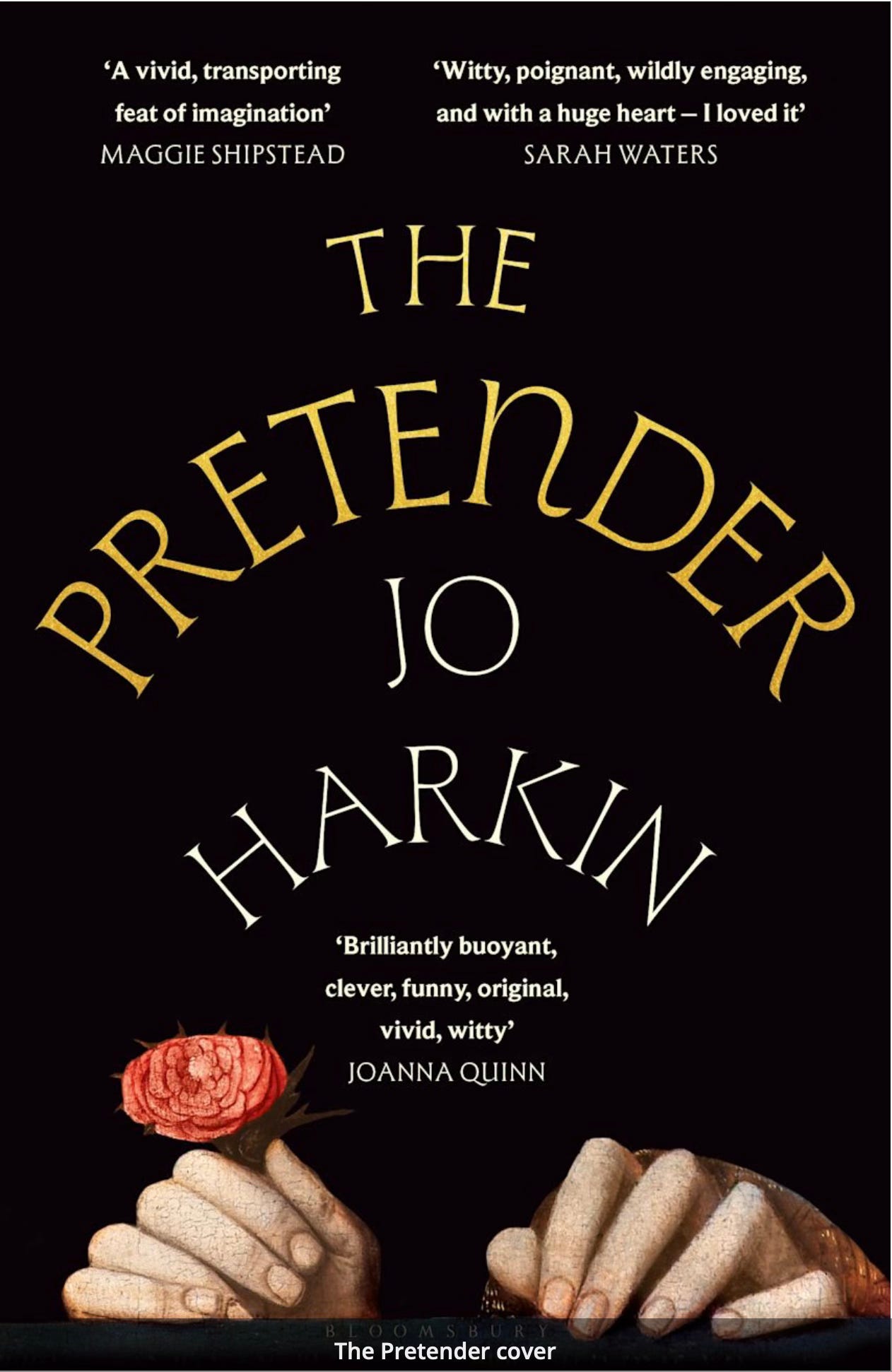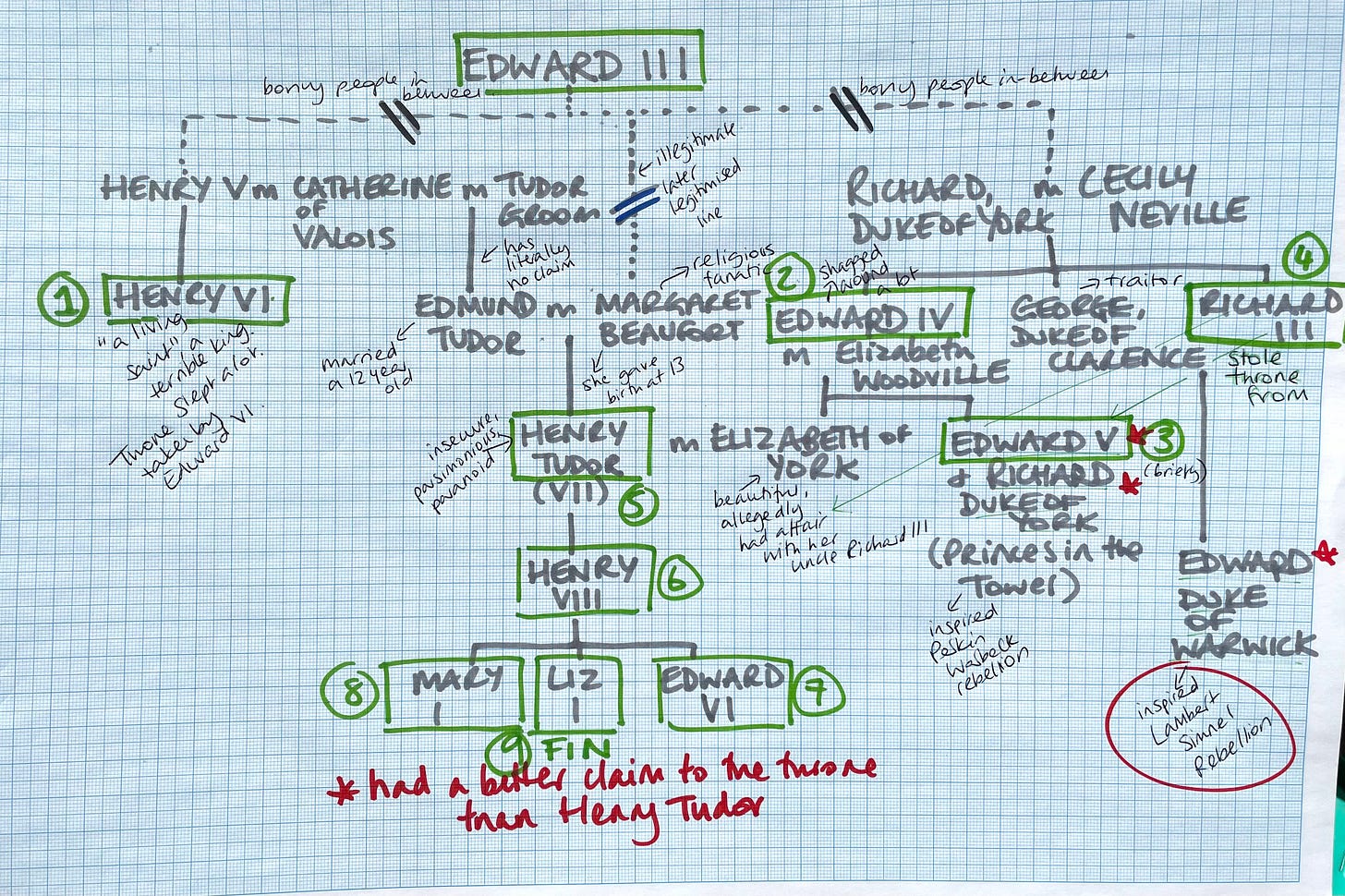Apologies, apologies for the clickbait title. I had a rather interesting response this week to re-posting a link to this article on Margaret Atwood. The article had me laugh out loud more than once, and I’m not sure I’ve ever read anything quite like it before - literary criticism written with controlled fury, outrageous audacity and continual swearing (if you don’t find swearing amusing, would v much advise against).
I loved it. And it really did make me rethink how I thought about Atwood - which is quite a turnaround for a bog-standard, stereotypical woman-who-did-English lit. (C’est moi.) I’d read everything Atwood ever wrote by my early twenties, queued for a book signing at university, and was memorably told off for asking if she’d sign a pal’s book.
Me: Please could you sign this ‘To Jack, with love’?
Margaret Atwood: ‘I’m not writing that.’
Me: *goggle eyed*
Margaret Atwood: ‘I don’t know Jack, and I certainly don’t love him’.
I mumbled an apology, and ran away - equal parts terrified and delighted to have a story starting ‘I got told off by Margaret Atwood!’ (Incidentally, Jack is now the owner of the fantastic Portobello Bookshop in Edinburgh, which I highly recommend for their curated recommendations and online shop.)
Anyway - I loved that Atwood’s books were undoubtedly literary, but also incredibly easy to read (of which more later). But I had doubts around the time The Handmaid’s Tale was televised, and actually couldn’t watch more than the first series - the violence seemed gratuitous. And then I couldn’t quite see the point of The Testaments, even though publication felt like the literary event of the century, and rereading Oryx and Crake earlier this year, I found quite a lot of it distasteful, without quite being able articulate why.
Eris in the review above has no such problem articulating her thoughts, and until I read her article, I really did just think everyone liked Atwood’s books, without ever interrogating my ideas - lazy of me. If you read it, I would be very interested to know what you think and if you’ve done a similar volte-face on a previously loved author. Or if you’re just more likely to change your mind if someone makes you laugh.
If you haven’t just unsubscribed in horror that I’ve shared content tearing down an international literary monument - COME AND SAY HELLO!
I’m speaking at the British Library Food Season, on Monday 28 April on a panel: ‘What is the point of a Cookbook’, chaired by Ruby Tandoh with food writers Ozoz Sokoh and Sophie Wyburd. It starts at 7pm, there’ll be books and chat and signings afterwards - there will be no Atwood style tellings off! Tickets via this link.
(The British Library is one of my favourite places in London - a temple to swottiness! - I popped in the other day on the way home from Euston and it just felt like home. So it’s v exciting to go in as a speaker. Ruby and I tried to prep the other afternoon, but mostly ended up feeding the children hot-cross buns, admiring Mia’s round little face and Alba’s engaging but completely random chat, so WHO KNOWS which of the cookbook greats we’ll demolish during the panel. Scandal incoming.)
Back on the subject of tearing down classics, I promised awhile back that I’d write a post about how much I loved Philippa Gregory. For weeks I’ve had a draft ready to go, which included:
a one paragraph précis of every female character in the Wars of the Roses to Elizabeth I (with many catty asides about the Tudors - I mean, what a tenuous claim to the throne)
a takedown of Eric Bana’s performance in the truly abysmal 2008 film adaptation of Other Boleyn Girl (props to the critic who described his Henry VIII as ‘the Incredible Sulk’)
an admission that I’ve read all fifteen of the novels in Gregory’s Plantagenet-Tudor series multiple times without having a single physical copy. I keep all my genre fiction on a Kindle. Isn’t it dreadful? Am now outed as a hideous cover snob.
why in this family - spoiler alert! - we do not drink Malmsey wine. Dot dot dot…
This was my summary of the novels:
This is a world of palace intrigue, royal backstabbing, fabulous gowns, grasping families and levels of ambition that make the characters in Succession look like complete amateurs. Gregory’s writing is so engaging that you will ignore husband, dog and children to ‘find out what happened’ to characters who you know full well will be beheaded / divorced / cast-off, and in all cases, are LONG DEAD. Will it stop you reading long into the night? Nope. Is it worth it? An emphatic yes.
AND THEN, I read Jo Harkin’s brand new The Pretender, and was so blown away that it’s temporarily ruined me for Gregory. I opened Gregory’s Red Queen two nights ago and was actually unable to read much further than half-way, because the memory of Harkin’s brilliant prose style left me wanting something more from a novel on the period than just plot.
If you’re after a quick refresher on Lambert Simnel, here’s my take (largely plot, very little prose style - please skip if you’re already familiar with the history, though I have included salacious gossip):
Henry VII, the first Tudor king, had a tenuous claim to the throne** and married Elizabeth of York (daughter of Edward IV) to validate his claim after defeating Richard III in a future carpark. The marriage joined the warring York and Lancastrian clans and ended the Wars of the Roses - although Henry was so anxious about his status that he didn’t crown Elizabeth queen for absolutely ages. (That said, there were strong rumours that Elizabeth was having it off with her own uncle, Richard III. Grim.)
But the House of York had three heirs to the throne with an arguably better claim than Henry Tudor. Firstly, Elizabeth’s brothers, the Princes in the Tower - dispatched by Richard III if you’re on the Tudor side, or Margaret Beaufort, Henry VII’s mother if you’re on Philippa Gregory’s side. (Officially, it’s a mystery who killed them.) At the time of Henry VII’s reign, the princes were believed to be dead. The younger of the two boys, Richard, would become the focus for future rebellions against Henry, most of them orchestrated and paid for by his own mother-in-law, the dowager queen Elizabeth Woodville. So much backstabbing!
There was just one living York heir, Edward, Duke of Warwick - nephew to Edward IV, cousin to the two (missing/dead) princes and Elizabeth of York, and son of George, Duke of Clarence. Henry VII - paranoid - kept the child locked up in the Tower of London.
Lambert Simnel was a peasant boy whose minders claimed that he was the young Duke of Warwick, and that the Duke of Warwick in Henry VII’s keeping was an impostor. They lead a rebellion in his name, and The Pretender takes you from just before to - no spoilers - further on.
History lesson over! Now back to Harkin & Gregory. Gregory’s historical women are almost universally scheming, avaricious, selfish, and obsessed with power and prestige, if not for themselves, then for their children. From Elizabeth Woodville to Margaret Beaufort to Margaret Pole, many of the characters who tell the story of the Wars of the Roses to the end of Elizabeth I’s reign are essentially the same person, just with a different name tacked on. Even though we see all the action from their interior monologues - giving them a cosy, intimate quality - the women have very little depth, and reading about the same events again and again from the perspective of three to five characters does get a little repetitive.
Whereas Harkin’s Simnel - he’s fully three dimensional! Harkin writes with a raw energy, in clear, and often amusing prose - from the muck of the countryside and battles with a belligerent goat to the court of Henry VII, it feels like a full immersion in the 1400s. When we do meet a scheming medieval woman in The Pretender, she’s manipulative beyond belief, again in a fully three-dimensional way. I can’t say much more because I don’t want to spoil the plot - but if you liked Hilary Mantel’s Wolf Hall series, you will love this as a lighter and beautifully written read. (A friend, also an avid fan of Gregory, would like credit for describing Mantel’s prose as 'often turgid’, which I think is fair - you have to be in the right mood.) But if you like Philippa Gregory, you’ll love Jo Harkin as a page-turning look at the period, from the point of view of a young boy at the opposite end of the social scale.
That said, I can’t really throw Gregory under the bus, when she was the one who sparked my interest in the Wars of the Roses. What sort of person gets excited hearing ‘it’s a novel about the 1487 Lambert Simnel rebellion'? Philippa Gregory fans, that’s who. Her fiction (after I exhausted Jean Plaidy at what - 13 or 14?) really was a gateway into a completely new period of history - everyone knows about Henry and his wives, hardly anyone knows about the women behind the Wars of the Roses. And if they weren’t such a gentle read, would I have re-read them quite so many times?
On my first gallop through her Plantagenet novels, she saw me through an entire summer working at a restaurant kitchen. Between shifts - the kind where you come home past midnight and go back for 7am) I would lose myself for hours to Elizabeth Woodville and her increasingly desperate plots, and would have no regrets at work the next day, only a longing to get home and download the next book in the series. Gregory also saw me through two maternity leaves and more, and I will doubtlessly pick her up again (there’s a new one coming out in October.)
But - I think I’ll re-read The Pretender again first.
Given my level of historical fandom, you cannot imagine my delight when Tim mentioned that his mother’s family descended ‘from someone called Margaret Pole’. I’m sorry what? Someone called Margaret Pole? The star of Philippa Gregory’s The King’s Curse? Margaret Pole, daughter of Isabel Neville and traitorous drunkard, George, Duke of Clarence, one of the sons of York? Margaret Pole, niece to Edward IV and Richard III, mother of Cardinal Reginald Pole, the last Catholic Archbishop of Canterbury? Margaret Pole, the oldest woman to be executed by her cousin Henry VIII? That Margaret Pole?
(And readers, we know he didn’t spot the Philippa Gregory on my bookshelf before making this outrageously interesting statement - because there are none.)
‘Er, yeah, her’. I looked at him with renewed interest. He explained that it was apparently on the wrong side of the sheets, but still.
‘Well,’ I said, moving him further into the category of ‘man I will almost certainly marry*’ - ‘we must watch The White Queen. So you can meet your relatives.’
This was a mistake.
‘God, she’s really overacting, isn’t she?’, he said, watching Janet McTeer chew the scenery. He was roundly shushed. ‘That’s Jaquetta Woodville! You can’t talk about her like that, she might curse you.’ (She was tried for witchcraft in real life.) Rebecca Ferguson, we agreed, was perfectly cast as Elizabeth Woodville, but then she can’t put a foot wrong. ‘AND THERE’S YOUR UNCLE GEORGE!’, I crowed, as the Duke of Clarence walked on. We watched him skulk through the series, alternately shifty, drunk and treasonous. ‘Yeah… sorry you got the worst York brother.’
It would have been poor taste to raise a glass when George was executed - he was given a choice as to his method of execution, and chose to be drowned in a barrel of his favourite wine. (He’d been found guilty of treason, after a final failed attempt to steal throne from his brother Edward IV, fuelled by his hatred for Rebecca Ferguson - how?! She’s amazing. He really did have it coming.)
That said, anyone sending a bottle of Malmsey wine is off the Christmas card list.
*Gregory is fond of citing the famous York good looks, their height, their charm etc. Tim says for the record that he doesn’t want me to explain, point by point, why I think he’s well fit, so I will just say that I think Gregory would approve.
**Massive postscript here - saved the most random thing until last, but the reason I keep snarking about the Tudor claim might work better with a picture:
Red stars for everyone with a better claim to the throne than Henry Tudor. Green rectangles numbered from 1-9 for the order in which people became king/queen, whether after a battle or not. (I am an incurable nerd and drew this from memory, hence the gap between Edward III and his warring great-great / great-great-great grandchildren.)


Finally - FINALLY - I was reading Vita Sackville West’s excellent Some Flowers the other night, and as an aside she mentioned that the gloriously candy-striped Rosa Mundi (pictured right) is often mistaken for York and Lancaster (pictured left)- a v odd name for a pale pink tinged rose. An obliquely relevant gardening aside for you - and a rec both for Vita’s spectacular book, and the rose (my second Rosa Mundi is arriving after Easter, v excited.)
I hope you have a wonderful weekend - less history, and perhaps more food next week…! Mini xx










What a brilliant post!! I love this love letter to your love for…addictive, readable, and as you say, plot driven fiction!! And of course, particularly historical fiction. Have you read the C.J.Sansom Tudor Henry VIII books? They are brill! I was pretty snobby about them before I read them, but they are genuinely great. Evocative, thoughtful prose, and also, less dense and heavy than Mantel (although I loved those too!). Anyway, I had to pass that rec. on! Have you got into detective fiction yet? That’s my not-so-guilty pleasure these days. Fred Vargas is just brill, and have just started the Vera Stanhope series, which I’m loving!
Great post. Margaret Atwood has never really appealed to me, but I’ve been vaguely aware that I ‘should’ like and read her. I couldn’t read the whole long post about it though. I love that period of history, (including the boring bits) but can’t quite get on with Phillipa Gregory. I read and enjoyed Cecily by Annie Garthwaite last year. I also find Dan Jones’ non-fiction very readable, including the Plantagenets and The Hollow Crown. Also, for anyone interested in primary source material around the Wars of the Roses, Helen Castor is writing about the Paston Letters here
https://open.substack.com/pub/helencastor/p/how-to-read-the-paston-letters?r=1cyod9&utm_medium=ios